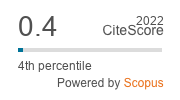Exploring plant seed extracts as potential sources of trypsin inhibitors for insect pest management: screening and characterization of inhibitory activity
DOI:
https://doi.org/10.33307/entomon.v50i1.1422Abstract
This study aimed to identify seeds containing trypsin inhibitors by screening 17 plant species. Plant seed extracts were prepared by homogenizing soaked seeds in a bicarbonate buffer (pH 9.0), followed by centrifugation. The resulting supernatants, rich in soluble proteins, were subjected to a protease inhibition assay. Among the seventeen seed extracts examined, ten exhibited significant trypsin inhibition, with notable examples including Pterocarpus marsupium (98.20±0.5%), Barleria repens (97.75±0.25%), Ipomoea sepiaria (93.80±0.15%) and Distimake vitifolius (91.79±0.71%) have not been previously reported as sources of trypsin inhibitors.
Downloads
Published
How to Cite
Issue
Section
License
Copyright (c) 2025 Association for Advancement of Entomology

This work is licensed under a Creative Commons Attribution-ShareAlike 4.0 International License.


